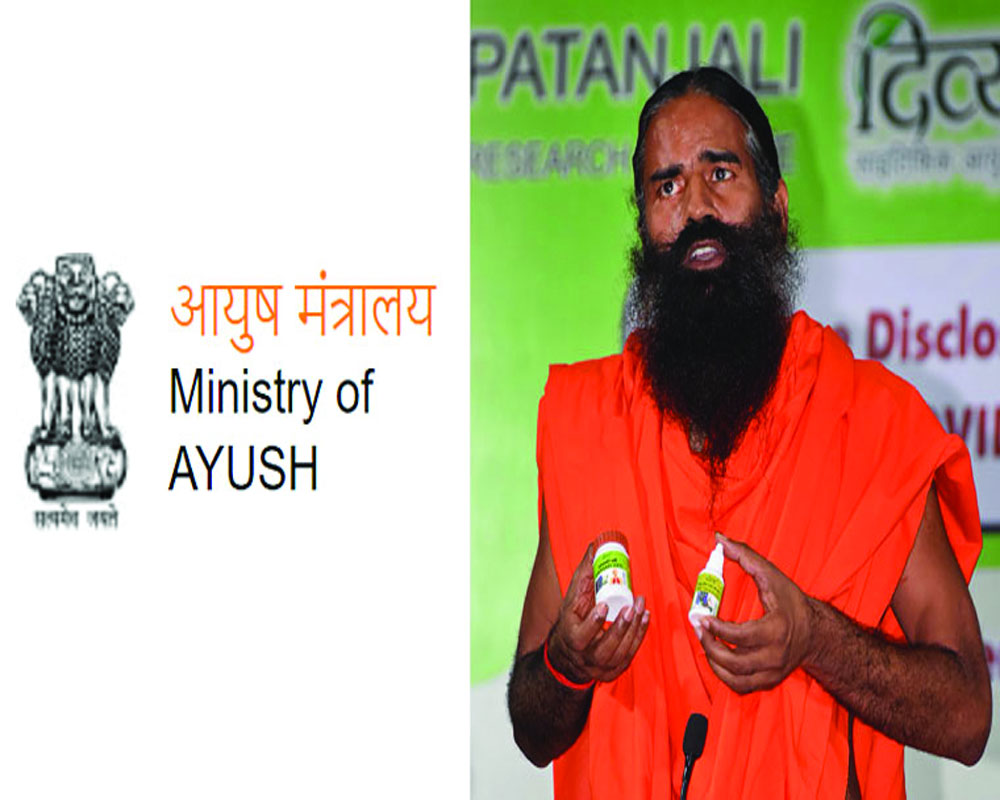By claiming a drug for COVID while procuring its licence as a preventive, Patanjali has diluted research into our herb heritage
If the slew of products, from disinfectants to immunity boosters, is any indication, then a subsidiary economy has evolved from the fear of the pandemic. So anything claiming preventive properties against the virus is vanishing off the shelves. But it is just that, preventive, and not a cure. That, however, has not stopped some adventurous companies from claiming that they have the cure at a time when doctors, scientists and pharmaceutical companies are scrambling for a drug or a vaccine. Alternative medicine systems like homoeopathy, Ayurveda, Siddha and Unani offer prophylactics, too, but their effectiveness as a cure is still untested. Yet much like all precautionary protocols, these, too, can be effective in proofing immunities. So Yoga guru Baba Ramdev’s outrageous claim that he has found two new medicines — Coronil and Swasari — that cost Rs 545 and have shown a 100 per cent recovery rate in patients within just 14 days has done a great disservice to the cause of traditional medicine, which has slowly established its place in our overall health and well-being routine. Worst, even assuming that Ramdev did indeed chance upon a magic elixir from the treasure trove of Himalayan herbs, he applied for a licence duplicitously, claiming that his was a cold, cough and fever drug with immunity-boosting properties. And once the licence was got and the time came for a rollout, he claimed it was a cure. Even his insistence that he had tested the drug in clinical trials at the Jaipur-based National Institute of Medical Sciences and Research (NIMS) rang hollow with the Rajasthan Government denying any knowledge of such an experiment. The Ministry for AYUSH, too, stopped the drug promotions, saying it had no information on either formulations or their efficacy in tests. Besides, Ramdev’s Patanjali group sidestepped the Drug Controller General of India, whose approval must be sought before a medicine is put out in the market. On the contrary, he flooded fawning media houses with his invention, all of whom forgot to ask the right questions of him. Some insiders say that Patanjali did test the drug on suspects, asymptomatic and mildly symptomatic patients but stayed away from severely symptomatic patients and those with acute respiratory distress syndrome. Baba Ramdev is still adamant about his cure and claiming communication gaps but how can one trust a man, who had said he could cure homosexuality through yoga, at face value? Besides, who would condone his flagrant violation of codes and the mockery of our drug laws? Anyway, this episode has exposed how our drug regulation regime can be played around with by unscrupulous businesses. And for somebody like Ramdev, who has a hold of the public consciousness courtesy his advertisement blitzkrieg, he inevitably ends up looking like a victim of the big pharma lobbies rather than an offender. If found guilty, he and his firm can be booked under two Acts, the Drugs and Cosmetics Act, 1940, and the Drugs and Magic Remedies (Objectionable Advertisements) Act, 1954. These seek to prohibit advertisements for “remedies alleged to possess magic qualities” or “misleading advertisements”, which give a “false impression regarding the true character of the drug.” There is provision of a six-month prison term and fine for the first conviction, extendable to one year for repeat offenders. But all such clauses mean nothing because of a glaring loophole. The owner of a company making such claims could absolve himself if he shows that the offence was committed without his knowledge or if he can prove that he exercised all due diligence to prevent the offence from being committed. Most companies have got away by exploiting this condition and Patanjali, which has good connections with the powers that be, isn’t likely to be booked but asked to lie low instead.
Drug control laws need more teeth since they have an impact on our public health policies and the Advertising Standards Council of India has aired concerns time and again over the glaring mismatch between promotion campaigns and the actual potency of the peddled drug. The Health Ministry has even released the draft of Drugs and Magic Remedies (Objectionable Advertisements) (Amendment) Bill, 2020. The proposed penalty for first conviction is now up to two years and fine up to Rs 10 lakh. A second conviction would lead to an imprisonment of up to five years and fine up to Rs 50 lakh. But more deterrence needs to be built in, like scrapping licences. For this is not the first time that Patanjali is overselling itself to vulnerable Indians hoping to avoid visits to the doctor. Back in 2016, it was fined Rs 11 lakh for “misleading ads”, “misbranding” and “misrepresentation” of its products like honey, salt, mustard oil, jam and besan, which failed to meet quality standards. In 2017, the Army suspended the sale of its popular amla juice to soldiers and the Food and Drug Administration (FDA) in Haryana judged its cow ghee as “substandard and unsafe.” The biggest casualty has been ayurveda, which indeed has the capacity to root out stubborn diseases. In fact, scientists from Indian Institute of Technology (IIT) Delhi, in collaboration with AIST, Japan, have found that the herb, ashwagandha, may hold a strong potential in fighting COVID-19 and are carrying out further research. Ayurveda has never been in conflict with science. Baba Ramdev should understand that first.
(Courtesy: The Pioneer)








 OpinionExpress.In
OpinionExpress.In















Comments (0)